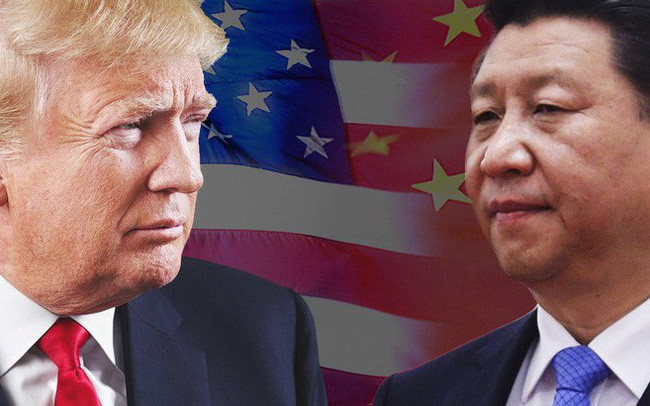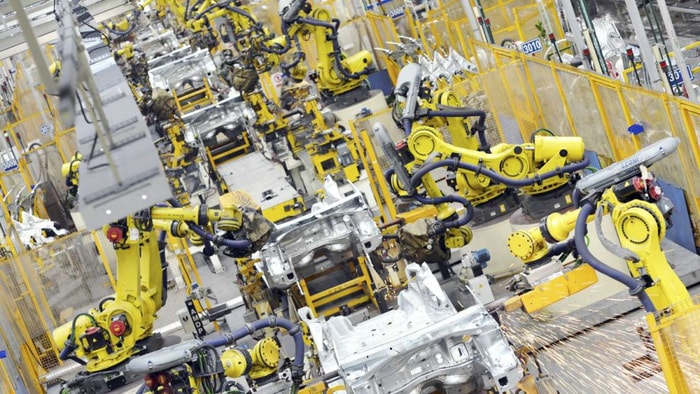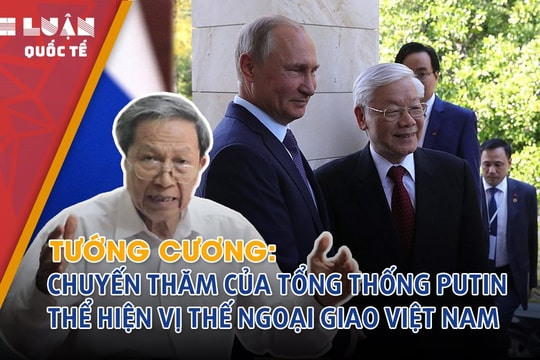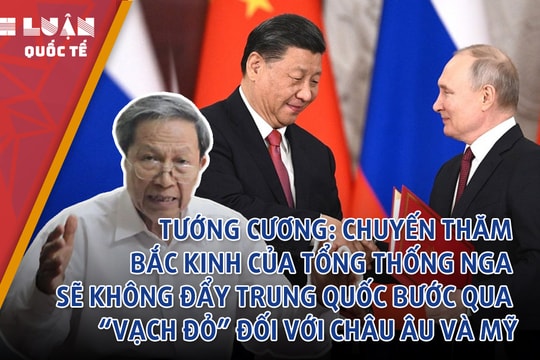General Cuong predicts the US-China trade war scenario and its impact on Vietnam
(Baonghean.vn) - The US and China have just entered the "largest trade war in economic history" by imposing new tariffs on tens of billions of dollars worth of imported goods from each side. Nghe An Newspaper interviewed Associate Professor, Dr. - Major General Le Van Cuong, former Director of the Institute of Strategy and Science of the Ministry of Public Security, to discuss a number of issues from a researcher's perspective.
PV:Major General, can you tell us about the conflict between the US and China during President Donald Trump's term?
Major General Le Van Cuong:This issue began nearly 2 years into the 2016 presidential campaign, when candidate Donald Trump repeatedly criticized China. He said that China is a strategic competitor of the US when using predatory economic tactics to threaten its neighbors and militarize the East Sea region. Through unfair competitive tactics such as undervaluing the yuan to serve the export of Chinese goods to the US and the world. In addition, China dumps goods and forces US businesses operating in China to transfer all or part of their technological know-how to Chinese partners.
According to candidate Donald Trump, these tricks of China steal jobs from hundreds of Americans every year and cause the US to lose about 100 billion USD/year. Even during the election campaign, Mr. Donald Trump said that China is America's enemy, if elected President, he will impose a 45% tax on Chinese goods entering the US.
In terms of economics, President Donald Trump is a real estate businessman and is superior to his predecessors such as President Obama, George Bush, etc. because these people have not yet discovered the shortcomings in trade between the US and China. It is President Donald Trump who has looked deeply and realized the trade imbalance in the US-China relationship. I think President Donald Trump's discovery in this issue is very respectable and correct.
After taking office as President in early 2017, with the motto of America first and the view of restoring America's greatness, President Donald Trump is determined to solve economic problems for the United States and other countries. Donald Trump always prioritizes bilateral relations and is not satisfied with multilateral relations because he believes that multilateral relations cause damage to the United States. For example, after 2 days as President, Donald Trump withdrew from the Trans-Pacific Partnership Agreement TPP, withdrew from the Investment and Trade Agreement with Europe; reviewed the North American Free Trade Agreement...
Fourteen months into his presidency, Mr. Trump continues to fulfill his commitment to take strong measures against China's trade practices that he "labeled" as unfair.
In particular, Trump is determined to impose high taxes on goods from other countries entering the US, such as temporarily imposing taxes on solar panels and imposing high taxes on large-sized washing machines from China in early 2018. In addition, the Donald Trump administration announced the results of an investigation under Section 232 of the Trade Expansion Act of 1962. According to this law, the US agency decided to impose a 25% tax on steel and 10% on aluminum imported from the US. Regarding China, on March 23, the Donald Trump administration announced the results of an investigation under Section 301 of the Trade Act of 1974. This report clearly stated that Chinese goods entering the US must increase taxes, and the US will restrict the acquisition and merger of Chinese businesses in the US.
 |
| The confrontation between the US and China. Photo: Internet |
Many sources believe that March 23, 2018 was the first "shot" that "fired" the US-China trade war when the Donald Trump administration announced plans to impose new tariffs on imported goods worth up to 60 billion USD from China and other restrictive measures against Beijing.
On July 6, 2018, the US imposed a 25% tariff on 800 items with a total value of 34 billion USD imported from China into the US each year. The remaining 16 billion USD of the plan to tax 50 billion USD of these goods will be implemented in 2 weeks.
Immediately, Beijing announced similar tariffs on 545 imported items from the US, including agricultural products, vehicles and seafood. The total import value of these items from the US to China every year is also 34 billion USD.
In my opinion, this is not exactly a trade war, but just the prelude between the US and China, not official yet.
PV:Dear Major General, what is the real goal of the Donald Trump administration in imposing tariffs and "opening fire" on China's trade?
Major General Le Van Cuong:In my opinion, the Donald Trump administration's goal of imposing tariffs on Chinese goods has two types of goals: goals directly aimed at China and goals within the United States.
For China, the US's imposition of tariffs on goods has three purposes:
The first,minimize China's trade deficit with the US. In 2017, the US trade deficit with China reached about 375 billion USD. Mr. Trump also asked China to cut its trade surplus with the US by 100 billion USD in 2018; asked China to increase its imports of US energy such as liquefied gas; reduce China's purchase contracts with Iran, Iraq... to focus on importing liquefied gas energy...
Through that we can see, this is a request that China must reduce its trade surplus with the US by all means, specifically reducing 100 billion USD worth of goods to balance US-China trade.
Monday, the Donald Trump administration criticized China for favoring domestic businesses and discriminating against foreign businesses, especially American ones. In addition, China has introduced strict regulations that hinder American businesses. Therefore, the US requires China to open its market and not force American businesses operating in China to transfer all or part of their technological know-how to Chinese partners.
TuesdayWashington also targets “Made in China 2025,” a Chinese government program to replace imported products in 10 strategic industries with domestic products. The core goal of “Made in China 2025” is to make mainland industry “self-sufficient,” with specific plans such as ensuring self-sufficiency of 70% of basic raw materials and accessories for industries such as aviation equipment and telecommunications equipment manufacturing.
As a result, China's superior investment will surpass the US, which is why Mr. Trump is more concerned about China's technological advances in the near future than the trade imbalance between the two countries by slowing down the implementation of "Made in China 2025".
I think this is the main purpose of the US in imposing tariffs on China.
As for the US internally, it can be said that in the 16 months of being in power, the Donald Trump administration has implemented many domestic and foreign policies that have reduced people's trust, and there is a risk that it will be difficult to win an overwhelming majority in the Senate and House of Representatives in the mid-November election. Therefore, in addition to implementing tariffs on Chinese goods, the Donald Trump administration wants to demonstrate its ability to fulfill its promises to gain the support of voters who previously voted for him, especially when the mid-term election will take place at the end of this year. At the same time, it will make the Republican Party, through this term's election, still dominate the majority of the Senate and House of Representatives.
PV:Dear Major General,,Can you tell us what China's response has been and is about to be?
Major General Le Van Cuong:We already know that right after the US implemented the tax on 34 billion USD from China imported into the US each year, China also publicly announced to increase the price of US goods imported into China with the same value of 34 billion USD. Accordingly, at the end of this month they will increase 16 billion USD to equal the US. That is a response that can be seen as completely public, transparent and proportionate.
 |
| China's taxed industries include aerospace, information and communications technology, robotics, and machinery. Pictured: A robotic arm on an assembly line in Wuhan, China. Photo: Reuters |
Such a scenario would play out as follows:
The first, China continued to negotiate, each side took a step back to make concessions and compromises.
MondayThe US is attracting the EU, Japan, and India to cooperate to focus on confronting China, forcing China to open its market and strictly implement its WTO commitments.
TuesdayIf pressured, China could be pulled out of the WTO and a new trade market created.
WednesdayThe Sino-US confrontation continues to escalate and impact the global stock market, causing the whole world to fall into a new spiral.
Thursday, The US continues to resolutely punish on a larger scale and force China to partially make concessions, meeting US demands.
PV:Can you tell us how this trade war affects Vietnam?
Major General Le Van Cuong:First of all, this trade war has an impact on the world. Because these are the two largest economies in the world, it will certainly impact the global economy and depending on the level of confrontation between the US and China. And up to this point, the US-China trade confrontation has not had a major impact on the world.
Like many other countries, Vietnam directly benefits from this trade war. When the door for Chinese goods to the US gradually closes with an import tax rate of up to 25%, it can take advantage of the US market opportunity with similar export products. However, the US and China are also the two largest export markets of Vietnam, China is the largest import market, so trade tensions between the two major economies will certainly affect Vietnam.
In this war, Vietnam still has an advantage when the US, Japan and the European Union are in tension with China, they will look to other markets such as ASEAN. Therefore, Vietnam will have the opportunity to be interested in investment, trade exchange, science and technology... In short, the US-China trade war is both an opportunity and a challenge for Vietnam.
PV:Thank you, General!


.jpg)
.jpg)




